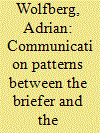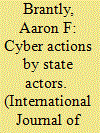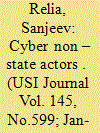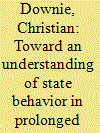| Srl | Item |
| 1 |
ID:
132424


|
|
|
|
|
| Publication |
2014.
|
| Summary/Abstract |
Intelligence professionals called "briefers" provide intelligence information on a daily basis to senior civilian policymakers. Herein is a description of what actually takes place prior to, during, and after the face-to-face interaction. While a body of work exists on presidential briefings, this assessment is unique because it deals with the process of transferring knowledge to policymakers, and specifically from the briefer's perspective. Individuals from the outside, and even intelligence officers or others who have studied intelligence but have not been "briefers," might find some of this material fascinating, yet possibly hard to believe. But those who have been "briefers" will find that this mostly validates their experience."
|
|
|
|
|
|
|
|
|
|
|
|
|
|
|
|
| 2 |
ID:
132419


|
|
|
|
|
| Publication |
2014.
|
| Summary/Abstract |
Covert action is as old as political man. The subversive manipulation of others is nothing new. It has been written about since Sun Tzu and Kautilya. People and nations have always sought the use of shadowy means to influence situations and events. Covert action is and has been a staple of the state system. A dark and nefarious tool often banished to philosophical and intellectual exile, covert action is in truth an oft-used method of achieving utility that is frequently overlooked by academics. Modern scholars contend that, for utility to be achieved, activities such as war and diplomacy must be conducted transparently. Examined here is the construction of utility for a subset of covert action: cyber attacks.
|
|
|
|
|
|
|
|
|
|
|
|
|
|
|
|
| 3 |
ID:
143090


|
|
|
| 4 |
ID:
114696


|
|
|
|
|
| Publication |
2012.
|
| Summary/Abstract |
Many of the most significant international treaty negotiations take years, and sometimes decades, to conclude. The international climate negotiations, trade negotiations, and law of the sea negotiations are all examples. Yet, notwithstanding their common occurrence and importance, prolonged international negotiations are not well understood. In these negotiations, state preferences are not fixed, but fluid, as negotiating positions change. This temporal dimension of prolonged negotiations is insufficiently captured by existing theories of international negotiations, which, by virtue of their focus on individual negotiation outcomes at one point in time, tend to be static in their analysis. This article combines an analysis of existing theories of international negotiations with the findings of an empirical study of the climate change negotiations. It reveals a series of internal and external factors distinct to prolonged international negotiations, emphasizes the importance of the temporal dimension, and explains how and why the negotiating positions and the type of agreements states are prepared to sign change over time. Building on these variables, state behavior in prolonged international negotiations can be usefully conceived of as (at different points in time) either an immature or mature game, in which strategic opportunities arise at different phases of the game for networked actors to constructively influence state behavior. Eight strategies are suggested that traditionally weak actors can employ to steer prolonged international negotiations toward their preferred outcome.
|
|
|
|
|
|
|
|
|
|
|
|
|
|
|
|